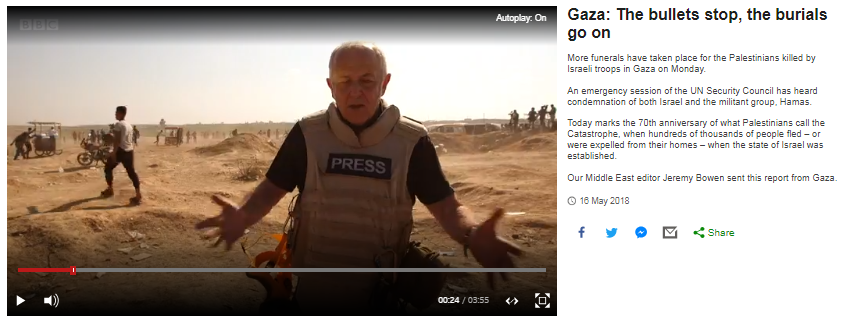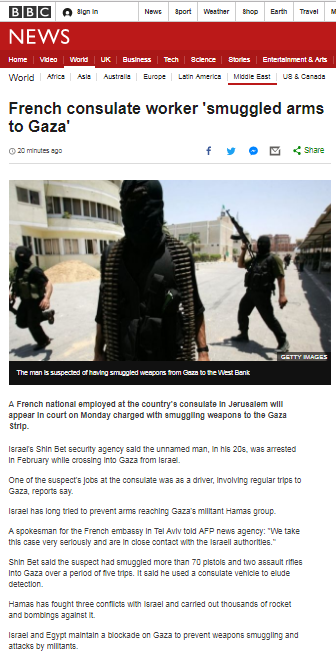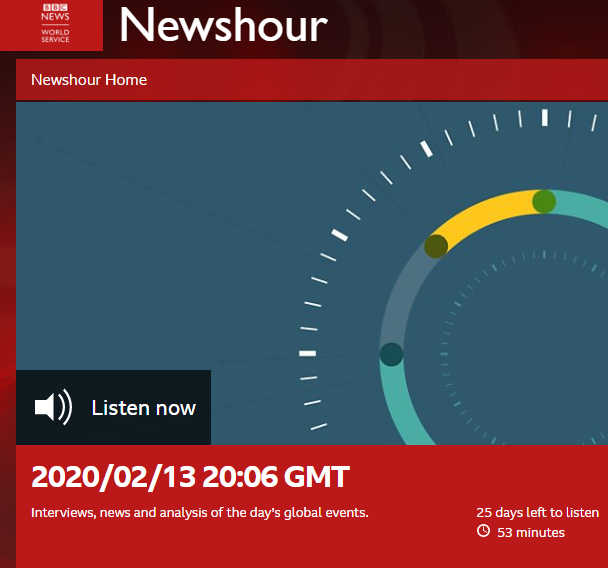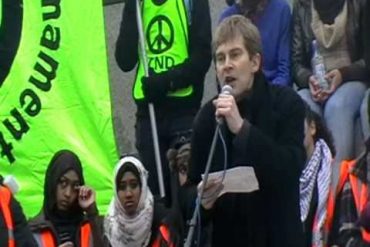A filmed report by the BBC’s Middle East editor Jeremy Bowen which was aired on BBC One’s ‘News at Ten’ and on the BBC News Channel on May 16th was also posted on the BBC News website under the headline “Gaza: The bullets stop, the burials go on“.
“More funerals have taken place for the Palestinians killed by Israeli troops in Gaza on Monday.
An emergency session of the UN Security Council has heard condemnation of both Israel and the militant group, Hamas.
Today marks the 70th anniversary of what Palestinians call the Catastrophe, when hundreds of thousands of people fled – or were expelled from their homes – when the state of Israel was established.
Our Middle East editor Jeremy Bowen sent this report from Gaza.”

Bowen – who appears to have actually filmed the report on May 15th – began by giving a context-free portrayal of the previous day’s events, which he described as “protests” despite their violent nature.
[emphasis in italics in the original, emphasis in bold added]
Bowen: “On the border the soundtrack was anti-Israel songs – not gunfire. 24 hours after the killing, the big protests have stopped but tyres were burning and Palestinians looked warily towards the Israeli positions. Enterprising traders brought refreshments.
So what’s next? The Israelis deal with the international political fall-out. The Palestinians have 60 dead. Politicians and diplomats abroad call for peace but real peace talks ended – failed –a long time ago and with the current generation of Palestinian and Israeli leaders, there is no chance of them being revived.”
Bowen refrained from clarifying to viewers that the ‘headline’ of the ‘Great Return March’ publicity stunt that led to those deaths is promotion of the so-called Palestinian ‘right of return’ – an expression of intent to eliminate the Jewish state, thus rejecting peace altogether. He went on:
Bowen: “The Israelis started firing tear-gas. The crowd by then – including many families – was getting too big and the young men were getting too close to the border wire. On the other side, the Israelis say they’re in the right.”
Viewers then heard from IDF Spokesman Jonathan Conricus.
Conricus: “We are not here looking to create casualties of Palestinians. That is not our aim. We are simply here to defend what is ours. We are defending our sovereignty, our civilians that live in close proximity, against an onslaught led by a terrorist organization that is using civilians in order to penetrate into Israel.”
Bowen next gave a context-free portrayal of the topic of Palestinian refugees – carefully avoiding inconvenient topics such as why generations of Palestinians have deliberately been kept in refugee camps and refugee status for seven decades by their leaders and the leaders of Arab countries. He inaccurately suggested that the flight of those who became refugees is attributable exclusively to Israel – carefully avoiding the subject of the Arab leaders who in many cases urged or ordered them to leave their homes.
Bowen: “Much of Gaza’s rage is born in places like Beach Camp [Shati – Ed.] – still a home for refugees 70 years after more than 700,000 Palestinians fled or were forced out of their homes by newly independent Israel. Palestinians call it Nakba – catastrophe. 70% of Palestinians in Gaza are refugees stuck fast in history.”
Failing to tell viewers about the leaflets warning Palestinians to stay away from the border that were distributed by the IDF on the morning of May 14th, Bowen went on:
Bowen: “At the al Farouk mosque, Yazen Tobasi’s funeral was much quieter than his death: shot through the eye during the protests. His body was wrapped in the Hamas flag. He was 23 and his friends were there to bury him. There were tender moments. Israel says it told them to stay away from the border and Hamas is responsible for what happened. His friend Mohammed al Birawi [phonetic] said Yazen worked at the hospital without pay because of Gaza’s collapsing economy.”
As research by the ITIC shows (see pages 47/48 here), Tobasi – who also had a Hamas Qassam Brigades headband tied around his head at his funeral – was also claimed by another terror group – the DFLP – as one of its members and said by that group to have been killed on May 11. Bowen continued:
Bowen: “Poverty and grief breed anger. And so do the deaths of children. A family gathered for another funeral. It was for Layla al Ghandour who was eight months old.”
The day before this report was aired on BBC One and posted on the website, conflicting accounts of the baby’s death had already emerged with both a Gaza doctor and her father stating that she had a pre-existing medical condition. Nevertheless, the BBC did not edit out that part of Bowen’s report implying that the child’s death was linked to Israel’s response to the incidents along the border.
Bowen then found a disingenuous way to play down Hamas’ involvement in these incidents:
Bowen: “At Shifa, the main hospital, wounded men were being transferred to Egypt for surgery. Inside they were still treating casualties from the protest. This boy is 16. All day I’ve been asking Palestinians if Hamas forced them to risk their lives at the protests. No-one said yes. ‘I did it because Jerusalem is Palestinian’ said Wadi a Ras [phonetic] – unemployed, 24 years old.”
It is of course not claimed that Hamas has “forced” people to take part in the ‘Great Return March’ events. Hamas has, however, been involved in their organisation from the outset and has laid on transport and promised financial compensation to casualties and participants. Hamas leaders whipped up fervor prior to the May 14th events, urging participants to “bring a knife or a gun” and to use them “to capture soldiers or residents of Israel”.
What BBC audiences will remember though is that “no-one” told Jeremy Bowen that Hamas had sent them.
Viewers heard from a doctor at the Shifa hospital before the report ended:
Bowen: “This is the busiest time at the hospital since the 2014 war.
Sabbani: “As a human being I speak. It’s…it’s horrible to think about if you see yesterday the situation, it’s horrible. Crying, bleeding, pain, painful. What’s happening?
Bowen: “After the protests it seems that many people are hoping for some kind of turning point but the fundamentals of this conflict don’t change.”
The BBC’s Middle East editor’s job is to “make a complex story more comprehensive or comprehensible for the audience”. Obviously playing down Hamas’ role in the violence audiences saw on their TV screens on May 14th does not meet that purpose and – as we shall see in part two of this post – Bowen was not the only BBC journalist doing just that.
Related Articles:
BBC’s Middle East editor ‘explains’ Gaza violence
BBC Breakfast blames Israel for Gaza baby death




